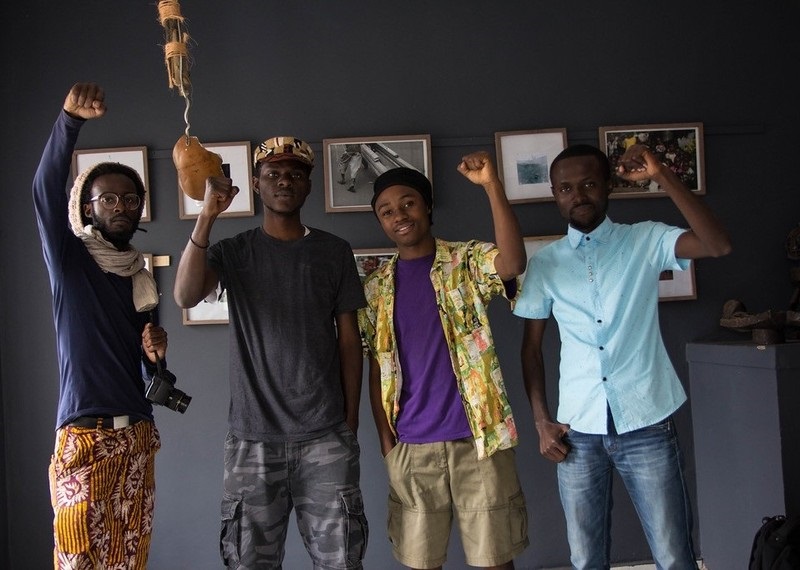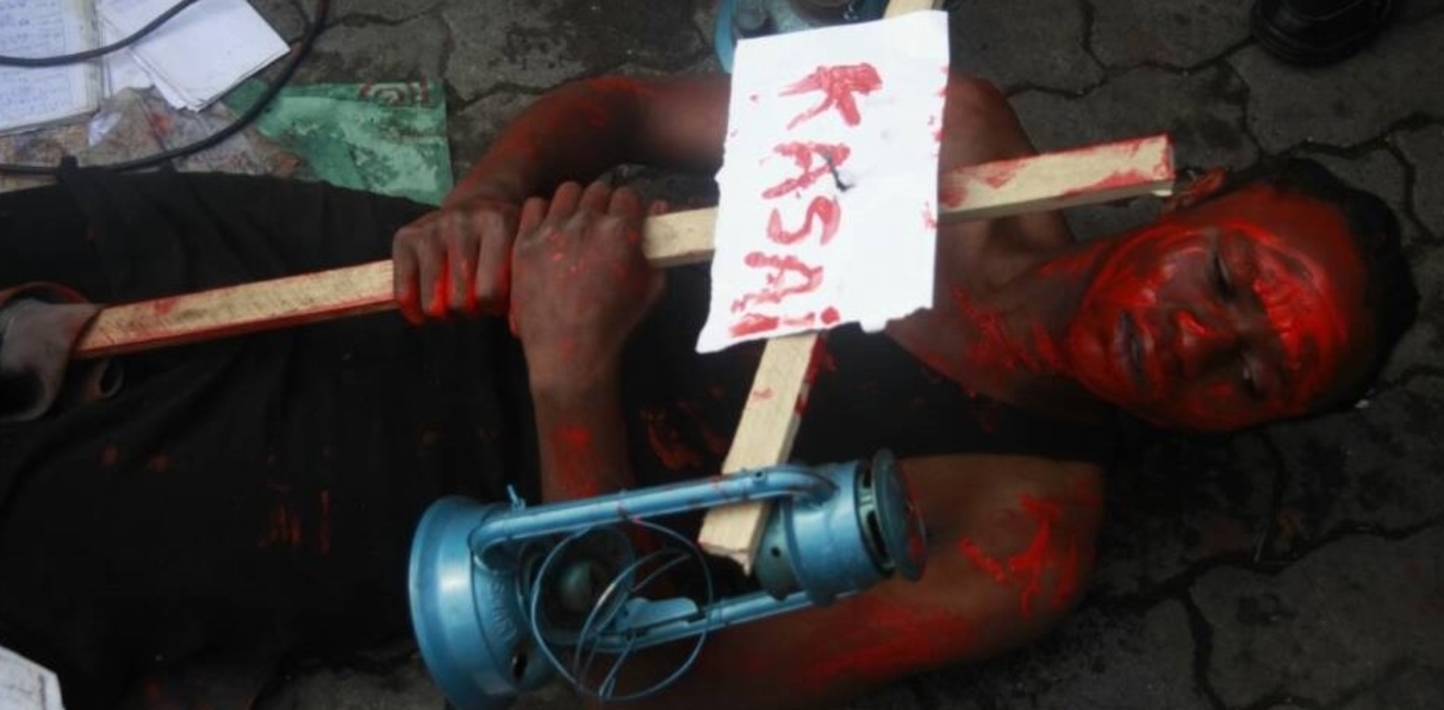Benoît is still seething with anger. “The Congolese people are being massacred every day in Beni and in Kasaï, and we don’t even have the right to complain or to mourn their deaths! Look at how this country treats those who speak out against injustice,” he says at the top of his voice, arms raised in the air to show that his wrist is handcuffed to that of one of his fellow activists. “Move it, you terrorists!” an angry-looking police officer orders.
Without ceremony, the four young artists are pushed with rifle butts into a dark room from which emanates the disgusting odour of urine, mould and marijuana. The cell, which is barely six metres square, is already packed with a dozen men and women suspected of murder, theft and other crimes. What crime was committed by Benoît and his three fellow activists? They staged an artistic performance in a public space in their town of Goma in the eastern Democratic Republic of the Congo (DRC) to condemn the massacre of the Congolese people and to demand justice. This gets them slapped with charges of “disturbing the public order” and “incitement to rebellion”.

What happened to Benoît and his fellow activists in June 2017 is a common occurrence given the magnitude and brutality of the repression of peaceful protests in the DRC. Whether it is opposition supporters or pro-democracy activists demanding respect for the Constitution and the holding of elections, children condemning the loss of their school or even public servants demanding payment of their salary arrears, protests are rarely tolerated.
The authorities use every means available: arrests and restrictions of movement, all manner of intimidation, switching off of radio signals, cutting telephone communications and shutting down the internet. When these measures are not enough to stop the protests, the police and the army are called in to put them down, often using excessive force and lethal weapons. The United Nations estimates that at least 300 people were killed by security forces in protests in the DRC between January 2015 and July 2017 while thousands of others were injured or arrested, and public as well as private property of considerable value was destroyed.
A government measure introduced in September 2016 barred all political protests across the country “until further notice”. Although never made public, the measure is regularly cited by mayors, governors and police officials to prevent all protests other than those organized by supporters of the government.
The DRC should create conditions that allow citizens to peacefully express their frustrations and to present their demands to the authorities without fear of being killed or persecuted.
Jean-Mobert Senga, DRC Researcher, Amnesty International
However, the Constitution of the DRC incorporates fundamental rights enshrined in major international human rights instruments, including the right to freedom of expression (article 23), the right to freedom of peaceful assembly (article 25), and the right to freedom of demonstration (article 26). A series of laws and regulations ought to have laid down the terms for the application of these constitutional provisions. And yet 11 years after the promulgation of the Constitution, these laws are still awaited.
As a result, administrative and judicial authorities interpret these constitutional provisions as they wish, that is when they choose not to ignore them altogether. In some cases, they continue to apply an obsolete decree of January 1999 which stipulates, among other things, that “protests and meetings organized in public spaces may be subject to prior authorization”. Yet, in this regard, the current Constitution clarifies that organizers of protests “along public roads and outdoors” only have to inform the relevant authority in writing.
In March 2015, opposition MP Delly Sesanga initiated a draft law laying down measures by which to implement the right to peaceful assembly. Even though his motives seem laudable, most of the measures contained in the draft law will only further codify obstacles to the actual exercise of the right to peaceful assembly rather than prevent them. In the draft law, the written notification set out in the Constitution is disguised as prior authorization, spontaneous protests are banned and problematic concepts such as “public order” are not defined. This draft law should be abandoned, plain and simple.
The freedom to think and to express one’s opinions, either alone or collectively, whether in private or in public, is as essential and beneficial for the individual as it is for society. The DRC should create conditions that allow citizens to peacefully express their frustrations and to present their demands to the authorities without fear of being killed or persecuted. This can be achieved through the adoption of legislation that meets international standards on freedom of peaceful assembly and association. In any case, the Congolese authorities have no excuse for violating the right to protest. The constitutional provisions and specific norms drawn up by the African Union and the United Nations, including those in relation to maintaining order during protests, must be implemented.
After one week in detention, Benoît and his fellow activists were released on bail. But the damage was already done. They should never have been arrested and imprisoned for peacefully expressing their views. A Facebook user made this comment on the treatment meted out to them: “Stop being naive! This government only listens to the language of weapons.” Unfortunately, this feeling is widely shared by the Congolese people. Expanding the civic space in the DRC would not only ensure fundamental human rights, it would also create an alternative to violence.
This article was first published in French on 5 October 2017 on DR Congo online news website Actualite.cd


